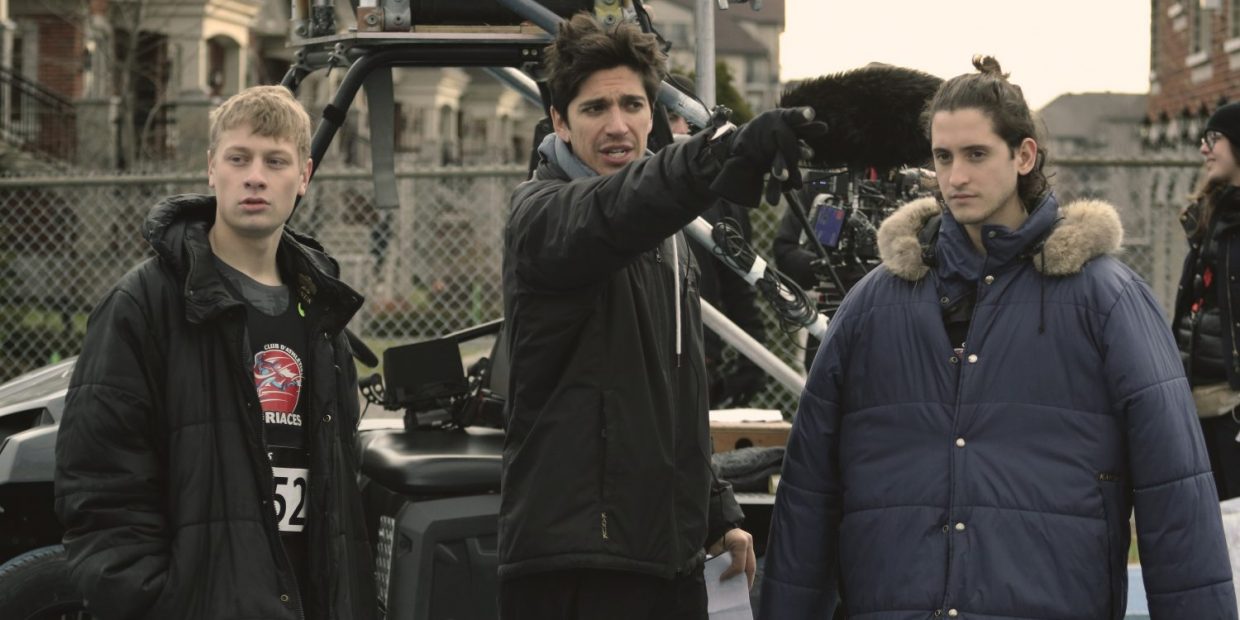Exposing the social stigmas, heated rivalries and silent anguish of the adolescent years, Yan England’s tensely constructed 1:54 stars Antoine-Olivier Pilon of Mommy fame as a meek young track runner and science enthusiast who quietly endures the escalating ridicule of school bully and fellow track competitor Jeff (Lou-Pascal Tremblay).
With 1:54 now available on FilmDoo as part of this year’s MyFrenchFilmFestival, we spoke with England about this poignant, finely acted drama and the universal issues that it addresses.
What was the inspiration for this story?
The inspiration came from two places. First, I’m an 800-meter runner. I’ve been competing and doing sports in Canada since I was a kid. So the whole element of the sport, the whole of the competition, overcoming your own limits, and always trying push yourself to a higher level was part of the background – and how there are some good rivalries and there are some not so good ones. That was one element that I wanted to explore.
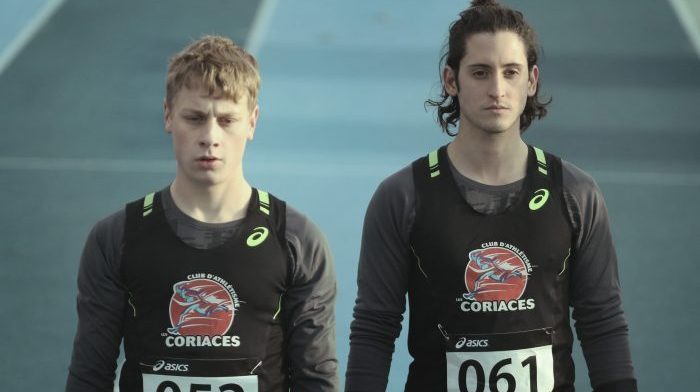
And the second element is the school and the bullying. Here in Canada I’ve been acting since I was eight years old. With of all these different TV shows and films, I’ve done a lot of work for teenagers on TV, hosting shows as well and acting. Since the beginning, I’ve had the chance to be really close to them. They’ve been writing me and asking, ‘How do you become an actor? How do you become a director?’ But I’ve also had emails saying, ‘This is what I’ve been going through in school.’ About a month before the holidays, I got a private message on Instagram from a kid in high school who wrote to me saying, ‘Hey, you don’t know me but today I had a really shitty day in school.’ I answered back asking, ‘What’s going on?’ And then I got the whole thing of what he was going through in school and the bullying that he was suffering from.
I’ve had that kind of relationship for a very very long time with different generations of teenagers. So I’ve never had what I call this ‘generational gap’ between their reality and ours. As soon as you leave high school, there’s a gap between what you remember from high school, or how you lived things in high school, and the reality that it is now – but I integrated. Everything in 1:54 is true. Everything that happens is true and it has happened to someone. It’s not the true story of one kid. It is actually the many true stories of many kids, and I’m also part of that because in my first year in high school I suffered through a bit of bullying as well.
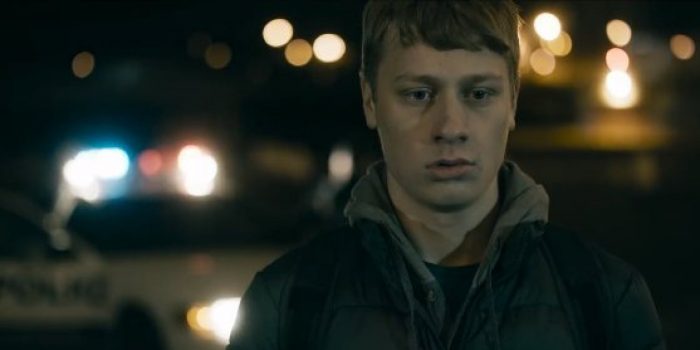
Did you come into this film with any particular message in mind?
I wanted to show two things with the film. First of all, I wanted to put the audience into the eyes of Tim and live what he is living. The entire film is from Tim’s point of view. When he’s ecstatic and when he’s extremely happy, you feel that. When he’s under a lot of pressure, I wanted people to feel that and immerse themselves into his reality and whatever he’s living, whatever he’s going through emotionally. It seems like it’s been connecting with people like that. And I wanted to show how far things can go. I’m not saying it always goes to the extreme you see the film, but it’s a reality.
And as you show in the film, social media can often enhance these problems. It creates new angles from which to bully.
Yeah, and this is a reality that some adults don’t realise. Maybe they’ve forgotten how things work in school and how secretly things can go bad. I’ve been getting emails and messages from wherever the film has screened. The film has been travelling all around the world and it’s been getting a lot of responses from people because they realise, ‘What he’s going through, I went through the exact same thing in high school or in elementary school’. And this is from adults – young adults and elderlies – as well a lot of teenagers. Every week I’m getting messages like that.
Or, on the opposite side, I’ve had guys and girls coming up to me after different screening saying, ‘I’ve just realised we have a Tim in my school, a kid who’s been going through that.’ Two guys once said to me, ‘We’ve just realised that we are the Jeffs.’ Up to that point, they were trying to do the exact same thing that Jeff was doing in the film and they hadn’t realised because for them it was just a joke. And that’s the biggest thing that people have realised. When teenagers are caught saying bad things to kids – calling them ‘bitches’ and ‘faggots’ and things like that – teachers have been telling me they always say, ‘It’s just a joke. He’s my friend. I know him. We’re just joking here and there.’

And social media? Ten years ago, if you were going through some bullying in high school, you at least had a break when you went back home at the end of the day and then it would start again the next day. Now today, with our phones, it follows you literally everywhere. It follows you in your back pocket and parents don’t realise that maybe something is going on.
So would you say that your film has helped in offering this alternate perspective?
That’s what people have been telling me. It’s been opening their eyes. I always want to make sure people know that obviously 1:54 is not a documentary on bullying. I call it a psychological thriller where people will experience what Tim is experiencing. But the greatest thing that it’s been doing so far since its first release is that it’s been opening up a dialogue. Bullying has what I call the law of silence: ‘If I say something, it’s just gonna get worse’. The film has been opening up a dialogue amongst students, amongst parents and their kids, amongst the teachers themselves, amongst everybody – and I think that’s the greatest thing.
I kid you not. There was this moment at the end of a screening where there was a whole high school between the ages of say 13 and 16, 17. This student says, ‘I just want to say that, yeah, I love the film and all of that but your film doesn’t represent the reality of our high school.’ So I’m like, ‘Okay, what do you mean?’ He says, ‘I mean we’ve erased bullying. Bullying doesn’t exist anymore in our high school.’ I’m like, ‘Really?’ and then I had the teachers there as well saying, ‘Yeah, we’ve gotten rid of bullying. When we see something, we talk about it. If we’re open to everybody, whoever is maybe suffering, they’ll come to talk to us.’
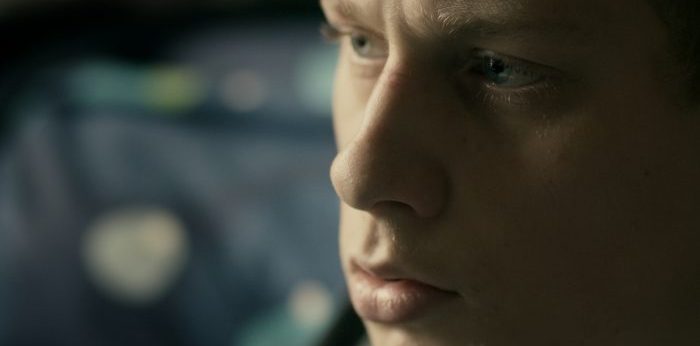
And then I’ve got two girls sitting up front. One is about 15 and she’s with her sister who’s about 16. And so the 15-year-old girl raises her hand and says, ‘I’m sorry, I just want to say something.’ She stands up and looks to everybody and she says, ‘You know everything that you’ve seen in the film? Everything that Tim is going through? Well I’ve been going through this every day for the past 4 years and I’m coming to your school.’
There was this huge silence in the theatre – from students, from teachers. And then her older sister, started to cry because she didn’t know. This is her sister with whom she walks to school. They live in the same house, they see each other every single day, they’re probably the best friends in the world but even she didn’t know that her younger sister had been a victim of bullying for the past 4 years. So it was a huge eye-opener. But what I mean by opening up a dialogue is that this young girl, the victim, she decided that the film helped her open up and then I saw the teachers like, ‘Okay we’re gonna talk and we’re gonna do this.’ She wrote back to me afterwards saying, ‘Things are on a positive slope here.’ So that’s great!
So that’s what it’s been doing positively. When I was a teenager, talking to my parents wasn’t the first thing I was gonna do. The most important people in your life are your friends in high school, not your parents, and sometimes there’s a disconnection. Parents who don’t necessarily know their kids are going through certain things watch the film and it opens up a dialogue with their kids.
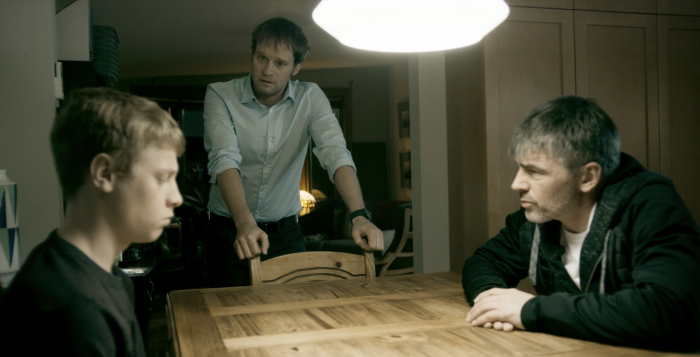
And you feel that this is where the solution lies? In getting people talking about these issues?
Yeah, because there’s the silence wall. Opening up a dialogue can obviously come from the victims but it’s always hard for them. So a lot of it I think will come as well from the bystanders seeing things. Sometimes it’s about just stopping in your day-to-day life to look at the broad picture. Like if you’re in school, just take five minutes and look at one place where there’s a lot of students. Just watch and then you will notice. That’s what I did when I was preparing for the film. For 1:54, the most important thing for me was the authenticity and to be super realistic. We shot in a real high school during school hours, so all the students that you see in the film besides my main actors are from the real school and they’re not acting. There are 1,250 students that are in the film and their reactions are real.
I’ll give you the best example. When Tim gets the mashed potatoes thrown at him in the cafeteria over lunch break, we shot this scene in the cafeteria over lunch break and none of the students knew we were gonna be shooting that scene. I told everybody, ‘Just keep doing your things and whatever happens happens.’ So when Tim gets the mashed potatoes thrown at him, the reaction that you see in the film are real. Some of them didn’t know what to do, some of them started laughing, some of them left because they were uncomfortable. That really happened.
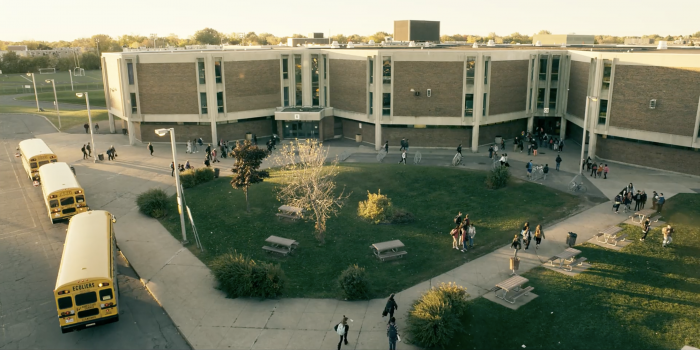
When Tim goes and punches Jeff in front of the school, we really shot that scene at the beginning of the school day when the buses got there. I rehearsed the scene with nobody around except my actors. When we were ready, I told them, ‘Everybody hide. I’ll give you a signal. I’m not gonna yell because I don’t want people to be aware that we’re about to do this scene,’ because I wanted to get the students’ real reactions.
And so when I’ve got the school buses coming in – students just chilling outside before school starts – I call action with a hand signal. They start to do the scene and the students’ reactions to the fight – when they all gather round and they all start cheering ‘Go! Go! Go!’ – happened for real. Nothing was planned. And mind you, this is a typical middle class high school in a middle class neighbourhood. So it was important to me to get the real feeling, and for the actors as well. They really became a part of the school. I wanted it to be authentic so that no one could say it doesn’t happen like that. It does, because it happened.
And so yes, after that, what’s important is opening up a dialogue if someone sees something. I mean there’s all the videos we see on YouTube where you see there’s a fight and you have five people filming it. No one is doing anything about it. They’re all bystanders. So if you see someone’s being bullied, or if you suspect someone is under pressure from another kid, then you have a responsibility. If you just talk to someone about it then, right away, we make a tiny hole in that wall of silence. And the more people who talk, the more we will open it up and then the flow will get even easier – and it is getting easier. I’ve noticed it from all the screenings.
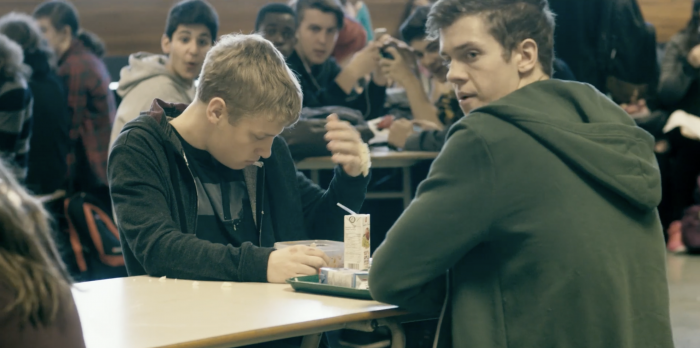
It is honestly a worldwide issue, whether you’re from Britain, from France, from Italy, from Taiwan, from China, from the States. I’ve had messages and from all around from kids saying, ‘This is what I’ve been going through,’ or ‘This is what I went through when I was in high school.’ So the more we open up and decide to talk about it, the less bullying will have an effect on people.
So while social media can make it easier to bully, it can also help people to connect and to bring exposure to these issues?
Of course with social media there is a very strong positive side to it. Honestly, I’m using it every single day. Just with the festival right now, it’s given the opportunity for people to know that something is happening, that there’s this film, the way people share it. One of the main ways that we first promoted 1:54 was through the different social media because people were like, ‘Oh, have you seen that there’s this film with Antoine, the guy from Mommy? I loved him in that film.’ Of course there’s a great positive side to it. There’s always a good and bad way. There’s always the yin and the yang.
We just need to be aware of the dark side of it and that bullying can happen to literally anybody at some point in their life. I’ve had this guy that came up to me. He’s about 6’4”, 6’5”, two-hundred-and-something pounds. So he’s a giant. Literally he can give me a tap on my head and I’m nothing, I disappear. He’d left high school the year before. He was the all-star basketball champion of his school at the beginning of the year. He tells me, ‘We had this important game, I made a huge mistake and because of that, we lost the game,’ and he said, ‘After that, inside my team, people started picking on me and picking on me and picking on me. This one guy started it and then other team members started as well. After a couple of months, it grew from being all solely in my team to the people in my school year and then it spread to the entire school.’
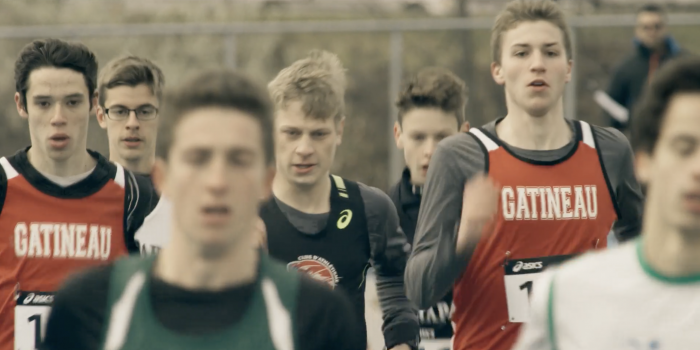
Now mind you, this is this huge, tall guy. Everybody’s pushing him and he started suffering a lot from bullying. First he dropped from the team, then he dropped from the school and started thinking about committing suicide.
So it doesn’t have anything to do with how strong you are. You could be tripping on something and people will start making fun of you and then it might just grow. But if people start deciding enough is enough, and people start sharing the news and using social media in a positive way, of course it has a positive effect because it brings people together. Right now we’re talking with a five-hour time difference. I can be sharing something over Instagram or Facebook or whatever, communicating something like, ‘Hey guys, this guy has done this film. Check it out, it’s amazing,’ or ‘Look this up. This kid has been going through this. We need to help him out.’ So if we use it properly and if we use it well then it can be an extremely powerful tool to open up a better dialogue.
How did Antoine-Olivier Pilon get involved in this film? Did he come into the project early?
Yeah, in my mind he came in very early because I started writing with Antoine in mind. I had seen Antoine before Mommy in a film here in Quebec where he was a hockey player. He was really great in it. Also, at the time I was hosting a TV show and I did an interview with him. He was just about to go bungee-jumping from the highest platform in North America. He was doing it for Amnesty International. I interviewed him right before he went up to the platforms and he was a very shy, very timid boy – very nice, very sweet. I do the first part down there and then I do the second part when he’s up there and just about to jump – and then I see a different guy. I noticed that he was completely different, standing super straight, fire in his eyes, ready to jump.
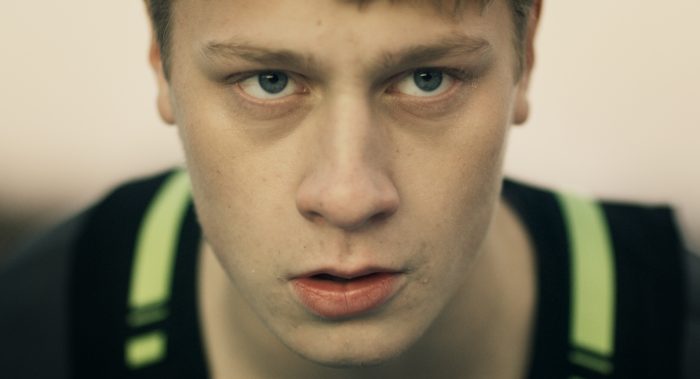
So I noticed Antoine has two personalities: a shy one and a very strong one. I had 1:54 in mind at the time, so I said, okay, this is my Tim. He is Tim. I’m gonna write the part for him. After that, I saw him in Mommy – an amazing, genius film by Xavier Dolan – in which he was spectacular. But what I was so happy about when I saw him in that film was that the part that I was writing for him was 180 degrees different. In Mommy, he’s a bigmouth, he yells, he’s a very hard-spoken kind of guy and he speaks a lot. In 1:54, he doesn’t have many lines. The emotion goes through a different way.
So when I was done with an early draft of the script, I contacted him and I said, ‘Read this and let me know what you think’. So at the time he was sixteen years old. He read the script, loved it, but he said, ‘Give me about a week. I wanna think things over. I wanna see if I’m ready emotionally to address that and to go there.’ I thought it was very mature of him to do so. The film deals with a lot of different topics and different emotions and so he took a week off and he came back to me.
He calls me up and I hear him speak in this very deep, sad voice. So I’m thinking, ‘Darn! I’m done. That’s it. He’s just gonna say he’s not gonna do it.’ I’d put all of my eggs one basket and he was the only guy I had in mind for this part. And he’s like, ‘Yeah, so I read the script and I had to think things over as you know and…I’m gonna do it.’ I’m sitting in my car and I’m like, ‘What? What? What?’ I think I didn’t hear well. So before I get excited, I ask, ‘What did you say? You said you were gonna do it?’ He’s says, ‘Yes, I’m gonna do it.’ I’m like, ‘Yeah!’
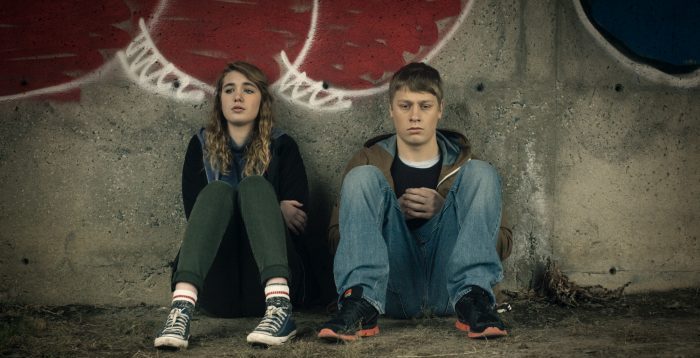
And when Antoine dives into a project, he dives in completely. It’s the same with all of my actors. They went for it completely. We worked together on Antoine’s posture because I wanted him to have his shoulders more forward so he wasn’t standing straight, because of the pressure he was going through in school. And because I wanted it to be so real, and because we shot in a real high school, what I asked of all my actors is that as soon as they got to set, they were obligated to only call themselves by their character names. They weren’t allowed to call themselves Lou-Pascal (Tremblay) or Antoine. It was only Tim, Jeff, Jennifer, because I wanted the entire school to know them only by their character names. So if things were to happen in the school – an improvisation moment or whatever – then we would use it.
At first they thought it was really hard because Antoine and Lou – who plays Jeff – are literally best friends in real life. They’ve known each other for a very long time. I forced them to never speak to one another except when they were doing the scenes, so they weren’t allowed to go out at night together. For the twenty-three days we shot the film, the only moments they were allowed to speak was on set and they weren’t allowed to call themselves by their real names. I forced them to completely immerse themselves in this real world. It made them really jump into the project. They completely went for it.
Antoine’s mom told me that when he was going back home at night, he was locking himself up in his room and didn’t want to talk to anybody. He really became Tim and he really started feeling the weight of what Tim was feeling. And you see it. You see every single beat of it in the film and even more.
1:54 is available to watch as part of the 2018 MyFrenchFilmFestival, running 19th January to 19th February. Find the full lineup on FilmDoo here.
Cover photo by Bertrand Calmeau

